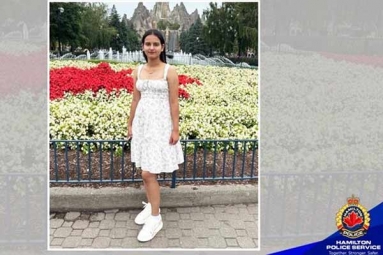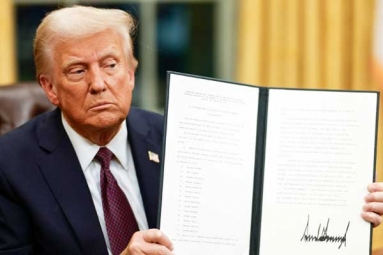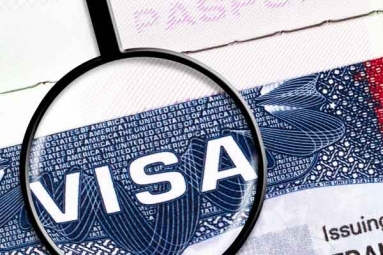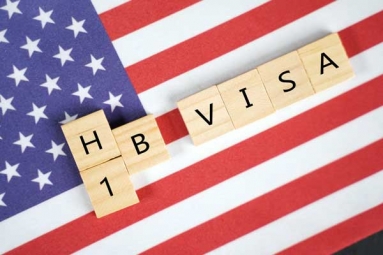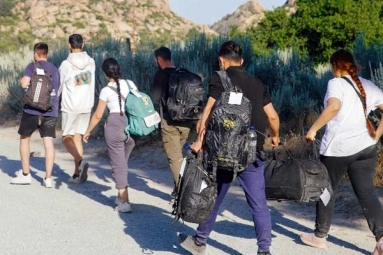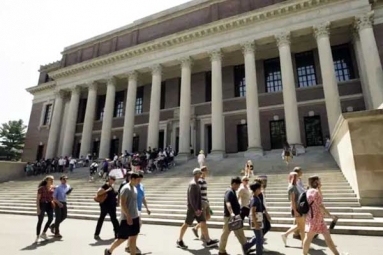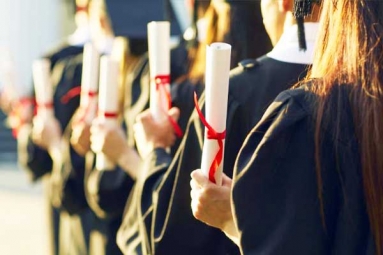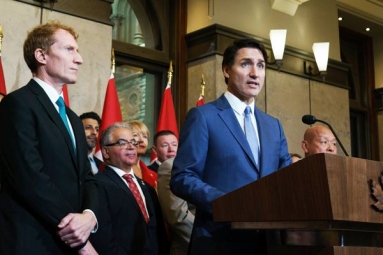Indian student killed in Canada by Stray Bullet April 19, 2025 10:19
A 21-year-old student from India lost her life after being inadvertently caught in a shooting between two groups in Canada. According to Hamilton Police, Harsimrat Randhawa was at a bus stop when a stray bullet hit her during the altercation that involved two vehicles. Enrolled at Mohawk College in Hamilton, Ontario, she was en route to her workplace at the time of the tragic event. Randhawa is the fourth Indian national to pass away in Canada within the last four months. The Consulate General of India in Toronto expressed that she was an innocent bystander who was “fatally struck” by the bullet. "We are profoundly grief-stricken by the tragic loss of Indian student Harsimrat Randhawa... As indicated by local authorities, she fell victim to random gunfire during a shooting between two cars. A homicide investigation is currently in progress. We are maintaining close communication with her family and providing them with all necessary support," stated a tweet from the Consulate. Hamilton Police reported that the shooting took place at the intersection of Upper James and South Bend Road. They discovered Randhawa suffering from a gunshot wound to her chest and swiftly transported her to a nearby medical facility, where she later passed away. Surveillance footage from the area captured an individual in a black vehicle firing at the people in a white sedan. Both cars fled the scene following the gunfire. Additionally, police noted that nearby homes were also impacted by the gunfire, resulting in bullets breaking a window; fortunately, no injuries were reported. This incident follows a series of three separate killings involving Indians in Canada over the past four months, prompting the Indian government to advise its citizens to be vigilant amid rising hate crimes and violent acts in the country. On December 1, 2024, Gurasis Singh, a 22-year-old postgraduate student from Ludhiana in Punjab, was fatally stabbed at his rented home. Another Indian student, also 22 and from Punjab, Rittika Rajput, died when a tree fell on her during a late-night gathering with friends; authorities are investigating this incident. Furthermore, on December 6, Harshandeep Singh, a 20-year-old of Indian descent working as a security guard, was shot and killed by a gang in Edmonton.
Read MoreMass lay-offs of Telugu employees in USA April 18, 2025 11:18
American mortgage leader Fannie Mae has dismissed approximately 200 workers, predominantly from the Telugu community, due to accusations surrounding a salary scheme. This significant layoff of employees with Indian roots has prompted three Indian-American lawmakers to reach out to Fannie Mae for clarification. They contend that the dismissal of the Telugu employees occurred without an adequate investigation. These individuals were affiliated with the Federal National Mortgage Association, recognized as Fannie Mae, the largest American firm by asset value. The 200 terminated employees were among the broader group of 700 staff members that the American corporation released as part of a restructuring initiative. The purported ethical breaches are associated with anomalies and the misapplication of Fannie Mae's matching donations program, which is linked to employee compensation. Led by Congressman Suhas Subramanyam from Virginia, three Indian-American lawmakers have addressed a formal letter to Fannie Mae, requesting an explanation for the collective termination of these employees, emphasizing that it was executed without prior notice or thorough investigation. The recent layoffs at Fannie Mae echo similar actions taken by Apple in January, when the tech giant ousted around 50 employees, including some of Indian descent, at its Cupertino headquarters due to allegations of financial misconduct aimed at inflating their salaries. The letter directed to Fannie Mae was endorsed by Congress members Subramanyam, Raja Krishnamoorthi, and Shri Thanedar. In their correspondence to William Pulte, Director of the Federal Housing Finance Agency, and Priscilla Almodovar, President and CEO of Fannie Mae, the lawmakers stated, "We are writing to seek information regarding the recent terminations at Fannie Mae related to alleged fraud and unethical conduct that have affected many of our constituents, particularly within the Indian American community." They underscored that the dismissals of numerous Telugu employees happened without a proper inquiry into the matter. “Although we align with your efforts to combat fraud and misuse within the federal system and housing sector, we are troubled by the apparent absence of due process for the affected employees and urge you to provide an immediate explanation to clarify why their employment was terminated without comprehensive investigation or prior notification," they noted in their two-page letter. In their correspondence, the Congress members pointed out that numerous individuals, who possess extensive experience and have consistently received outstanding performance evaluations, have claimed they did not engage in any misconduct. However, they were denied the chance to present their perspective or advocate for themselves. The letter noted, "It has been reported that these employees faced termination due to supposed breaches of Fannie Mae’s Matching Gift Program. My understanding is that the organizations these individuals supported were sanctioned by Fannie Mae for participation in the program." The Congress members also mentioned, "We have even heard reports that some Indian American employees were dismissed despite not having made any donations to these organizations or been involved in the Matching Gift Program." They voiced their apprehension that the alleged participation in the Matching Gift Program or contributions to certain Indian American entities may have been exploited as a reason to implement broad workforce reductions at Fannie Mae and to damage the reputations of employees through unfounded fraud accusations without proper inquiry. The Congress members specifically inquired whether those impacted were shown any proof of their supposed infractions regarding the Matching Gift Program or given a chance to contest their dismissals. According to a report from The Times of India, a significant portion of the 200 employees let go from Fannie Mae under accusations of ethical misconduct are of Telugu descent. Several individuals are purported to have conspired with the Telugu Association of North America (TANA) to mislead companies and misuse funds, which allegedly involved the inappropriate use of Fannie Mae's matching grants initiative. One of the recently terminated employees reportedly served as a regional vice president at TANA, while another is the partner of a former president of the American Telugu Association (ATA). Reports indicate that TANA is not the sole organization under scrutiny; other groups are also being investigated. Some Fannie Mae employees informed TOI that the layoffs occurred on April 9 and 10, justified by "ethical grounds." Additionally, certain Telugu organizations drew attention in January when Apple terminated employees over similar fraudulent allegations. Of the staff members let go by Apple, six were identified by authorities in the Bay Area and warrants were issued for them. Although none of these six individuals were of Indian descent, another report indicated that many of the dismissed workers were Indians, allegedly exploiting Telugu charity organizations in the United States for fraudulent activities. Now, Indian-American lawmakers are advocating for the dismissed Telugu employees at Fannie Mae. While fraud must be met with strict consequences, it is essential that thorough investigations and procedures are followed prior to any termination of employment. This is the cause the Congress members are championing.
Read MoreTrump's Citizenship Impacting Big on Indian Parents February 12, 2025 12:49
An executive order from US President Donald Trump that seeks to eliminate birthright citizenship for the children of temporary visa holders has caught immigrant communities, particularly Indians, by surprise. Presently paused due to a legal challenge, this directive has left many Indian families, especially those expecting children soon, in a state of uncertainty. The ramifications for Indian professionals holding H-1B visas are significant. Many believed their children born in the United States would automatically gain citizenship, but this order jeopardizes that assumption. “This directly affects us,” said Akshay Pise, an Indian engineer residing in San Jose, California, whose wife, Neha Satpute, is due to give birth this month. “If this order is enacted, we are unsure what the outcome will be—it’s unfamiliar ground,” he expressed to BBC. As the couple's delivery date nears, they briefly contemplated an early labor induction but ultimately chose against it. “I want the natural process to unfold,” remarked Ms. Satpute. Mr. Pise emphasized, “My main focus is on ensuring a safe delivery and my wife’s well-being. Citizenship is secondary.” The anxiety surrounding the order has made headlines, with some parents opting for premature C-sections in hopes of guaranteeing their child’s US citizenship. However, Satheesh Kathula, the president of the American Association of Physicians of Indian Origin (AAPI), counseled against such actions. “Given the stringent medical regulations here, I strongly advise against early C-sections solely for the sake of citizenship,” he stated. US resident Priyanshi Jajoo, who is expecting in April, voiced her concerns to BBC: “Do we need to reach out to the Indian consulate for a passport? What visa category applies? There is a lack of clear guidance.” Cyrus Mehta, an immigration lawyer based in New York, noted that “there is no provision in US law that grants non-immigrant status to those born here.” Without the promise of birthright citizenship, the future of H-1B holders’ children remains legally precarious. Ms. Satpute conveyed that the ambiguity surrounding this situation is distressing. “Pregnancy is already a stressful time, and we thought that after living here for ten years, things would ease up—then this happens on top of everything else.” Her husband pointed out their status as legal, tax-paying immigrants, insisting that their baby deserves US citizenship. “It has been the law, hasn’t it?” he remarked. Indians represent the second-largest immigrant community in the United States and would be particularly impacted by this order. More than five million individuals hold non-immigrant visas, and if this new regulation takes effect, their US-born children would not acquire citizenship. “Indians are dealing with the most extensive green card backlog of any nationality,” stated immigration policy expert Sneha Puri. Current regulations restrict green cards to 7 percent per country, and since Indians receive 72 percent of H-1B visas annually, the backlog has escalated to 1.1 million. David Bier, immigration director at the Cato Institute, cautioned that “New Indian applicants might have to wait lifetimes, with approximately 400,000 likely passing away before receiving a green card.” The executive order will also have implications for undocumented immigrants, removing birthright citizenship for their US-born children, who once had the ability to sponsor their parents for a green card at the age of 21. Estimates on the number of undocumented Indians differ—Pew Research suggests about 725,000, while the Migration Policy Institute estimates around 375,000. For those Indians holding H-1B or O visas, the primary worry revolves around the future of their children.
Read MoreHow H-1B visa holders stay beyond 6 years in the USA? January 28, 2025 14:49
Thousands of Indians work in the United States every year on a temporary visa like the H-1b, but have the dream of getting a permanent place of residence through a green card. The journey from H-1b visa to the constant residence in the United States depends on a form, a lawsuit I-140. If you submit a petition I-140, the people will be the US Green card guards and drive in the USA in the USA in the USA. The I-140 petition includes a constant residence program as a foreigner who works on a temporary visa. The H-1b visa is a temporary employment visa that enables employers to hire foreign employees, especially in science and technology, especially in science and technology, for which a bachelor's degree is required. Although the H-1B is only temporary, it is a double visa. In other words, visa holders can legally follow a permanent apartment (US Green Card), while the temporary situation is retained. Many people are concerned about the H-1b visual plan, in which President Donald Trump has an important problem of the election campaigns between immigrants and employment, but has been reaching the United States for years. Together with Trump in the White House, the Supercar amount attacks the Indians and the H-1b, and they are expected as an American kidnapper. However, some measures to migrate from the H-1b visa to the Green Card in the USA are required. At the beginning of the financial support of the employer, the employer sends the application form to the representation of foreign employees. The first step of this process is the validity or permanent approval of the work. Here the U.S. government employer must prove that the employment of foreign employees has no negative impact on employment opportunities and wages. This includes advertising for your local position and proves that justified employees cannot use them to play a role. If a Perm certificate has been approved, the employer changes to US citizens and immigration services (USCIS) to submit an immigration petition I-140. The lawsuit claims that foreign workers are entitled to green cards due to employment and tried to ensure primary days. This is important to determine the position in the Green Card queue. The importance of I-140 can ensure that the H-1B holder can extend the visa for more than six years. The I-140 has an H-1b visa in the Green Card process and can take years for rear protocols. Without confirmation of I-140, the H-1b visual owner, which ends at the end of a six-year border, must leave the United States. However, the verified I-140 changes everything. If you are in a country with important green cards such as India, I-140 has approved the H-1b visa according to the USCIS regulations from one to three years. However, there is an extension for all practical purposes as long as a visa owner receives a green card. As a result, you can continue your work in the USA and continue your life while waiting for the Green Card and releasing the urgent time pressure to return to your country. The last step in this process is to set the status set (form i-485) or to receive a US Green card with console processing. Applicants for countries with high residues such as India confront exceptional delays and often wait many years or decades a day. However, these forms of the petition can help maintain the legal status if the H1 -B owners continue to work and at the same time wait for a permanent place of residence. A joint experience in X (previous Twitter). H-1b is a double visa (explicitly enables immigration goals). The only way to remain in H-1B after six years of restriction is to use the I-140 program for employment-based Green Cards. Most Indians do not spend this step for numerical hats. "In these" temporary years "I worked for many celebrities with high technology and they paid more than ever." The way to a green card is a very serious threat. The report is that the Trump administration is considering this method. In any case, I have worked with I-140 for more than 15 to 20 years. The I-140 petition has effectively changed the temporary character of the H-1b visa for long-term residents in the United States. Applicants do not have to leave the United States unless the petition is rejected or the H-1b visa owner is not rested. According to the New York Times, the US Congress distributes 65,000 H-1B annually for employees who have acquired a bachelor's degree. These visa owners come from industries such as technology, education, healthcare and production. There are no restrictions on the number of employees who can be made from a single country, but more than two thirds of the H-1b visa come from India. Employers have to pay H -1B employees to pay the average salary to US workers who are in similar positions or similar positions. Despite this clear rating, the company's report on economic policy showed that 60% of employees employed in H -1B were paid for their 2019 professional role in accordance with the average wage at local level. The petition is 140 that temporary visa owners use their temporary protection to persist and contribute to the American community and the economy.
Read MoreIndian Man Gets 30-Month Jail In US For Customs Duty Evasion January 24, 2025 15:07
An Indian man who ran a jewelry company in New York was sentenced to 30 months in prison for importing more than $13.5 million worth of jewelry and illegally processing $10.3 million in an illegal money transfer operation . . U.S. Attorney Vikas Khanna pleaded guilty before Monish Kumar Kiran Kumar Doshi Shah (40) of Mumbai, New Jersey, and U.S. District Judge Estelle Salas of Jersey City, New Jersey, saying he charged him with conspiracy and Operation. Fraud and facilitation of the operation of unlicensed money transfer companies. In addition to the prison sentence, the judge ordered the restitution of $742,500 for the wire fraud and the forfeiture of $11,126,982.33 for the wire fraud and unauthorized fund transfers. The court also ordered two years of supervised release. According to court documents, from December 2019 to approximately April 2022, Shah engaged in a scheme to evade obligations to ship jewelry from Turkey and India to the United States. He instructs and/or directs conspirators to ship goods from Turkey and India. It will be one of its businesses in South Korea, although shipping directly to the U.S. will incur tariffs of about 5.5%. The Korean conspirators changed the labels on the jewelry to indicate that they came from South Korea rather than Turkey or India and sent them to Shah or his customers in the United States, federal prosecutors later said. Create fake packaging to make them look like its Korean The company actually orders the jewelry from Turkey or India. He also ordered an outside shipping company to provide U.S. Customs and Border Protection with false information about the jewelry's origins. During the specified period, Shah shipped approximately $13.5 million worth of jewelry from South Korea to the United States without paying the appropriate deposits. Additionally, from July 2020 to November 2021, Shah operated multiple jewelry businesses in New York's diamond district and used these businesses to illegally collect more than $10.3 million for his customers. Shah also collected cash from customers and used other private jewelry companies to convert cash into wire transfers and cheques.
Read MoreUSA H-1B Visa Overhaul From January 17th January 17, 2025 10:06
The United States is making major changes to its H-1B visa program on Friday, January 17th. The updated rules allow highly skilled workers to remain in the United States based on their employment status, one of the latest immigration policy reforms. The administration of outgoing President Joe Biden. The H-1B visa program, which has been instrumental in attracting talent from around the world, is undergoing several updates to modernize its structure and address ongoing challenges. The United States Citizenship and Immigration Services (USCIS) said on its website: “The H-1B final rule modernizes the H-1B program and its oversight, as more than 70 percent of H-1B visas are issued to Indian skilled workers. In 2023, owners will benefit significantly from these changes. Key Changes To H-1B Visa Rules: Definition of “Profession”: The new regulations update the definition of “profession” by revising the criteria for eligible positions. This clarifies that degree requirements are typically and not “always” required and allows for a broader range of qualifications where they are directly related to the job. Fairer lottery process: Stricter measures prevent organizations from submitting multiple bulk applications and ensure a fairer system. Smooth Transition for F-1 Visa Holders: Students with an F-1 visa will experience fewer challenges transitioning to H-1B status. Faster Processing: USCIS will expedite H-1B supplemental petitions to reduce delays for employees and employers. Greater Flexibility for Employers: Companies can hire H-1B workers based on their specific workforce needs and support dynamic workforce planning. Opportunities for Entrepreneurs: Entrepreneurs who own a controlling interest in a company can now apply for an H-1B visa if they meet stricter requirements. Enhanced Compliance Protections: USCIS' expanded on-site visitation powers, including inspections at workplaces, remote locations, and third-party sites, are designed to prevent abuse. Failure to verify the information during the inspection may result in rejection or cancellation of your H-1B application. New Petition Form: To improve compliance, a new, updated Form I-129 will be required effective January 17, 2025. This form is intended to simplify the petition process. Expanded criteria for exemption from the cap: Research-oriented organizations are now eligible for exemption from the cap based on clearer definitions that replace the previous vague guidelines. Additionally, a big change is on the horizon: H-1B visa holders will soon be able to extend their visa without having to return to their home country. This is likely to help Indian engineers holding H-1B visas in the US. Will H-1B Visa Policies Shift Under Donald Trump's Administration? While some factions of the Republican Party favor stricter immigration controls, including limited programs like H-1B, US President-elect Donald Trump has recently expressed support for high-skilled immigration. “I have multiple H-1B visas for my property. I believe in H-1B. I used it many times. It's a great plan,” Trump told the New York Times in December 2024. Earlier, during his first term as president, Trump limited access to foreign work visas and criticized the program.
Read More18,000 Indians at risk of being deported from USA December 14, 2024 14:59
President-elect Donald Trump takes office next month, and his administration is already ramping up efforts to tighten immigration policies. The U.S. Immigration and Customs Enforcement (ICE) has released data showing that 18,000 undocumented Indians are among the 1.45 million people deported from the United States. "Deporting undocumented immigrants is at the heart of Trump's border security agenda," ICE said. According to data released by ICE in November 2024, there are 17,940 Indians on the agency's detainer list. This includes people who are not in ICE custody but have received a final deportation order. Many undocumented Indians find themselves in a complicated and lengthy legal process, with some having to wait up to three years for their cases to be heard. The report notes that India is one of the 15 countries found to be "uncooperative" in the extradition process and is currently seeking appropriate action. “Conducting interviews, issuing travel documents in a timely manner, and physically repatriating its citizens on scheduled or charter flights in accordance with ICE and/or foreign government deportation policies,” the ICE document states. In the past three years, an average of 90,000 Indians were arrested at the US border for trying to enter the country illegally. Experts note that the lion's share of migrants come from Indian states such as Punjab, Gujarat and Andhra Pradesh. The ICE report highlights that the majority of illegal immigrants coming to the United States come from countries close to the United States' borders. Honduras ranks first with 261,000 undocumented people, followed by Guatemala with 253,000. In Asia, China leads with 37,908 illegal migrants, while India ranks 13th with 17,940.
Read MoreUS Universities Warn Foreign Students Amid Trump's Immigration Plans Fears November 30, 2024 10:57
Universities across the United States sent emails to international students and staff advising them to return to campus by January 2025, when President-elect Donald Trump begins his second term in the White House. The email comes amid growing concern over President Trump's mass deportation plan, which could affect thousands of international students, the BBC reported. With more than 400,000 undocumented students enrolled in college in the United States, all international students feel unsafe, the report quoted a University of Colorado professor as saying. The University of Massachusetts issued a travel advisory for international students and faculty in November, urging them to urgently consider returning to campus from winter break before Trump's presidency begins next January. The Office of International Affairs is including this recommendation out of an abundance of caution since it was adopted in 2016 during the first Trump administration. The Massachusetts Institute of Technology and Wesleyan University also issued travel warnings and urged students, faculty and staff to return to the United States by Inauguration Day. At Yale University, the Office of International Students and Scholars hosted a webinar this month to address student concerns about possible immigration policy changes. This also includes foreign students who are protected by the DACA (Deferred Action for Childhood Arrivals) policy. In 2017, President Trump signed an executive order at the White House banning citizens of several Muslim countries, North Korea and Venezuela from visiting the United States. He also proposed restrictions on student visas during his first term as president. President Trump is using all available resources to step up efforts in his first term to pressure so-called “sanctuaries” to cooperate with the U.S. government in deporting record numbers of immigrants. The entire agency is expected to be mobilized, Reuters reported, citing statements from six former presidents. This was announced by government representatives and coalition representatives. Trump supporters, including those who may serve in his second administration, expect the Republican president-elect to call on everyone from the US military to foreign ambassadors to follow through on his campaign promise to end mass deportations. Efforts include working with Republican-led states and using federal resources to confront rival jurisdictions. Immigration advocates warn that Trump's deportation initiative will be costly, divisive and inhumane, separating families and destroying communities, Reuters reports. According to the BBC, representatives of the new Trump administration have proposed creating more comprehensive detention facilities for illegal immigrants on deportation lists. His new Border Patrol chief, Tom Homan, said the priority will be removing violent criminals and national security threats from the country. However, this did not alleviate higher education concerns.
Read MoreIndia Overtakes China In International Student Enrollment November 18, 2024 14:54
India has surpassed China as the top source of international students in the United States, with over 330,000 Indian students enrolling in US higher education institutions in the 2023-2024 academic year, a 23% increase from the previous year. This growth was driven primarily by a 19% rise in graduate student enrollments, which reached 196,567 students. Additionally, the number of Indian students participating in Optional Practical Training (OPT) programmes after graduation increased by 41%, reaching a total of 97,556. US Ambassador Eric Garcetti expressed his excitement over this achievement, emphasizing the importance of international education in building future leaders and strengthening the bonds between nations. According to the report, Chinese students continue to be the largest international group pursuing education in the United States, with a total of 277,398 enrollments. Overall, the US hosted a record 1.1 million international students in the 2023-2024 academic year, a 7% increase from the previous year. The report also noted significant growth in graduate program enrollment (over 500,000 students) and participation in Optional Practical Training (OPT) initiatives (over 242,000 students). Additionally, the number of American students studying in India has seen a substantial rise, increasing from 336 in 2021/22 to 1,355 in 2022/23, a growth of 303.3%. International students in the US have a diverse range of academic majors, with the majority (56%) enrolled in STEM fields, particularly math, computer science, and engineering. Other popular fields include business and management, physical and life sciences, social sciences, and fine and applied arts.
Read MoreThe Rising Cost Of Foreign Education November 16, 2024 07:34
The USA is one of the most popular destinations among students who want to study abroad. Every year, the country attracts a large number of international students from all over the world. The cost of training here depends on the type and program of the university. Universities are divided into private and public/public institutions. Tuition fees at public universities are relatively lower than at private institutions. Tuition fees for international students in the United States range from $25,000 to $55,000 per year. The average cost of tuition and fees in the United States has reportedly increased in recent years. In 2018-2019, the average cost for public public universities ranged from $9,716 to $35,676 for private schools. Fees for humanities, education and arts courses are very low compared to subjects like medicine, engineering and business administration. The cost of studying in the UK has also risen over the years. Students in EU and UK will have to pay Rs 9250 or almost Rs 927485 per year. Tuition fees for international students start at Rs 10,000 or Rs 10,02,598 and go up to Rs 38,000 or Rs 38,10,205 for specialized degrees in medicine and other fields. Compared to the US and other countries, students choosing the UK can save significantly on living costs, and most UK universities offer shorter courses. A typical bachelor's degree takes three years instead of four, and a master's degree takes one year instead of two.
Read MoreThailand Announces Indefinite Visa-Free Entry for Indians November 05, 2024 15:12
Good news for Indian travelers! Thailand has announced that it will indefinitely extend its visa-free entry policy for Indian nationals, which was originally scheduled to expire on November 11, 2024. The policy allows Indian travelers to stay in Thailand visa-free for a maximum of 60 days. You can also extend it for another 30 days at your local immigration office. The policy aims to improve accessibility for Indian tourists and enable them to explore Thailand's enchanting sights and cultural heritage without a visa. The Tourism Authority of Thailand (TAT) confirmed the decision and officials at the Royal Thai Embassy in Delhi Nu said the indefinite extension would have a positive impact on Thai tourism and ease of travel for Indian tourists and shared their enthusiasm for the indefinite extension. Visa-free travel has many advantages as it simplifies travel preparations and stimulates the economy of the destination country. The main advantages are: Increase in tourism revenue: An increase in the number of tourists means an increase in demand for accommodation, restaurants, tours and transportation services, resulting in growth in the hospitality and tourism sectors. Job Creation: As visitor numbers increase, so do employment opportunities, supporting local businesses and benefiting communities across Thailand. Discover the wonders of Thailand: Thailand is a special travel destination with a unique combination of culture, natural beauty and adventure. Begin your journey in the dynamic capital of Bangkok, known for its grand palace and beautiful temples such as Wat Arun, which stand majestically against the city skyline. For a more relaxed experience, head north to Chiang Mai. The city has peaceful temples and access to green mountain areas for hiking. You can also visit the famous floating markets in the suburbs of Bangkok. Lively food stalls line the canals, offering a unique shopping experience. With great food, warm locals, and affordable options, Thailand is a dream destination for travelers. From beautiful beaches and ancient temples to vibrant cities, Thailand promises unforgettable experiences for all types of travelers.
Read MoreCanada Slashes Immigrant Intake Amid Public Worry October 25, 2024 06:27
Canada has announced a significant reduction in its immigration targets, a major shift for a country known for its welcoming approach to immigrants, including economic migrants seeking better opportunities. The country's population saw a substantial 3.2% increase from 2023 to 2024, the highest annual rise since 1957, now reaching 41 million. This surge was largely driven by an unprecedented wave of new arrivals. Prime Minister Justin Trudeau stated that while the influx helped boost the Canadian economy's recovery from the Covid-19 disruptions, the time has come to make "adjustments." Trudeau said Canada needs to stabilize its population growth to allow the government to catch up and make necessary investments in healthcare, housing, and social services to accommodate future population growth. The government plans to reduce the number of new permanent residents allowed to settle in Canada in the coming years, from 500,000 in 2025-2026 to 395,000 in 2025 and 380,000 in 2026. The target for 2027 is set at 365,000. The Immigration Minister called this a unique plan to control population growth in Canada. According to the 2021 census, 23% of the population was born abroad, with increasing numbers coming from Asia, the Middle East, and Africa. A recent survey found that a majority of Canadians believe there is too much immigration, a significant increase from 2023. Additionally, half of Canadians say immigration is harming the country. Immigration is primarily associated with concerns about a perceived shortage of critical resources, particularly affordable housing. Miller specifically emphasized the new plan's efforts to address what many Canadians describe as a housing crisis. He anticipated that reducing immigration targets would address the housing supply gap, leading to a decrease of 670,000 in the number of homes Canada needs to construct by 2027.
Read More
